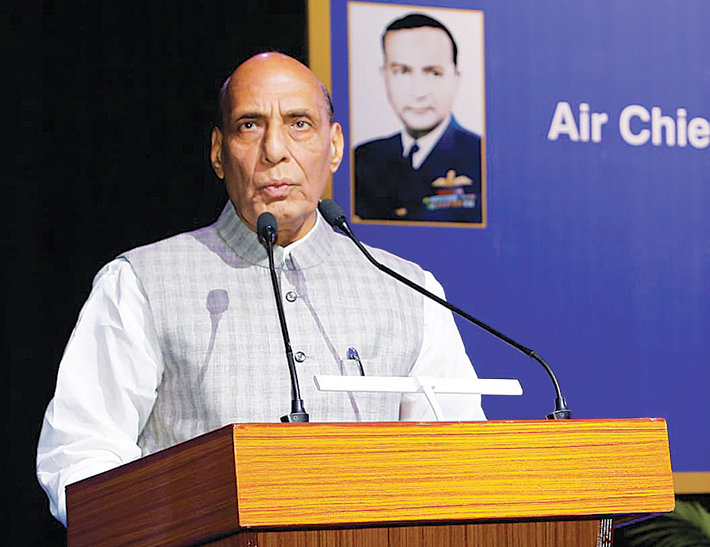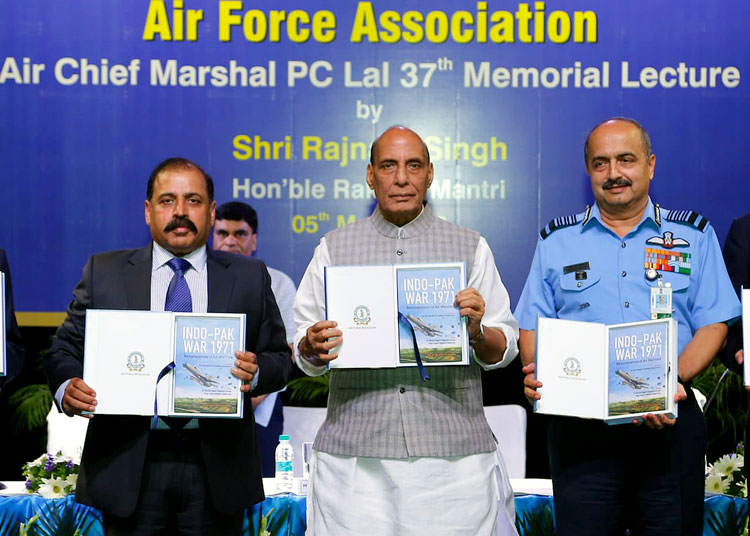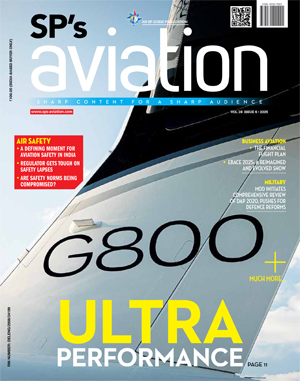INDIAN ARMED FORCES CHIEFS ON OUR RELENTLESS AND FOCUSED PUBLISHING EFFORTS

The insightful articles, inspiring narrations and analytical perspectives presented by the Editorial Team, establish an alluring connect with the reader. My compliments and best wishes to SP Guide Publications.

"Over the past 60 years, the growth of SP Guide Publications has mirrored the rising stature of Indian Navy. Its well-researched and informative magazines on Defence and Aerospace sector have served to shape an educated opinion of our military personnel, policy makers and the public alike. I wish SP's Publication team continued success, fair winds and following seas in all future endeavour!"

Since, its inception in 1964, SP Guide Publications has consistently demonstrated commitment to high-quality journalism in the aerospace and defence sectors, earning a well-deserved reputation as Asia's largest media house in this domain. I wish SP Guide Publications continued success in its pursuit of excellence.
- The layered Air Defence systems that worked superbly, the key element of Operation Sindoor
- Operation Sindoor | Day 2 DGMOs Briefing
- Operation Sindoor: Resolute yet Restrained
- India's Operation Sindoor Sends a Clear Message to Terror and the World – ‘ZERO TOLERANCE’
- Japan and India set forth a defence cooperation consultancy framework, talks on tank and jet engines
IAF should become an ‘Aerospace Force’ — Rajnath Singh, Defence Minister
The Defence Minister added that to protect our assets from space-guided attacks, IAF should operate on technology, developing expertise and human resource management

Rajnath Singh, Defence Minister of India, delivered the Keynote Address for the 37th Air Chief Marshal P.C. Lal Memorial Lecture on May 5, 2022, in New Delhi. The lecture was organised by the Air Force Association. Sharing the dais with the Defence Minister were Chief of the Air Staff Air Chief Marshal V.R. Chaudhari, President of the Air Force Association Air Chief Marshal R.K.S. Bhadauria and other key officials. The event saw a full house with senior officers of the IAF, both serving and retired, in attendance.
Remembering Air Chief Marshal P.C. Lal, Rajnath Singh stated, “Since, before independence, P.C. Lal witnessed the evolution of the Indian Air Force. Integration and Joint-ness are the major lessons from his life.” Air Chief Marshal P.C. Lal was commissioned in the IAF in 1939. As the 7th Chief of the Air Staff during the 1971 war, his outstanding leadership proved to be a decisive factor in India’s victory and the liberation of Bangladesh. He was awarded the Padma Bhushan in 1966 and the Padma Vibhushan in 1972 for his contributions during the two wars.
On the occasion, the Defence Minister also released a book titled ‘INDO-PAK WAR 1971- Reminiscences of Air Warriors’. The book hosts 50 articles contributed by the veterans who have elaborated on their experiences. The book has been edited by Air Marshal Jagjeet Singh and Group Captain Shailendra Mohan. Rajnath Singh quoted a few incidents from the book and mentioned that it is a praiseworthy collection of experiences of the Air Warriors. He mentioned, “What was commendable was the cooperation between the services, the two services (IAF and the Indian Army) worked together and impressive was the bold and imaginative use of the Air force to win the war.”
The Minister also made a special mention of aviator and former Odisha Chief Minister Biju Patnaik, “his role during the conflict with Pakistan over Jammu and Kashmir in 1947 can never be forgotten.”

The Defence Minister touched on the ongoing conflict and future warfare, “the Ukrainian conflict has lessons for future wars and the Indian Air Force must gear up for it”. He urged the Indian Air Force to become an “Aerospace Force” and be prepared to protect the country from the challenges of the future. “If we look at some of the recent conflicts in Syria, Iraq and Afghanistan, and more recently, Ukraine, we will get many insights from them to plan for future wars, although these trends are suggestive, but we can gain a deeper understanding by correlating them with our local threats,” he said. He added that to protect our assets from space-guided attacks, IAF should operate on technology, developing expertise and human resource management. “Technology has had a massive impact on not just wars but even our daily lives. It is not necessary that advanced weapons systems and platforms will ensure victory. Technology is a force multiplier, but without innovative employment, it will be reduced to a showpiece,” Singh said.
Rajnath Singh asserted that a greater synergy can be established through the process of integration, joint vision, training, planning and execution of operations between forces. “The ongoing process of integration of the Armed Forces is aimed at not only increasing the combined capability but also efficiency. We have to keep in mind that its long term success will depend on the vision of the planners just as much as it depends on those who implement it. I have full faith that in future more unity will be established not just ideologically, but also in action,” he said.
Sharing his outlook on being self-reliant (Atmanirbhar), Defence Minister described selfreliance as critical, “Our past experiences have taught us that India cannot depend on imports for its safety and security for long. Recent conflicts, especially the situation in Ukraine, have taught us that not just defence supplies, but commercial contracts are also prone to be affected when it comes to national interests.” He mentioned that domestic capability building is not an easy path and may not be cost-effective initially, but it will offer a middle and longterm benefit in building the foundation of a robust industrial base not only in the defence sector but in every sphere of the industry.
He listed out some of the recent initiatives taken by the Government, terming them as building blocks of a self-reliant structure which will empower the domestic manufacturers and help India emerge as an exporter of defence equipment.
Defence Minister Rajnath Singh reiterated that the Government is leaving no stone unturned to ensure the safety and security of the people of the country. He added that India has emerged as the foremost responder for out of area contingencies across the region. He commended the Armed Forces and other organs of the State for their combined contribution in achieving the objective.





